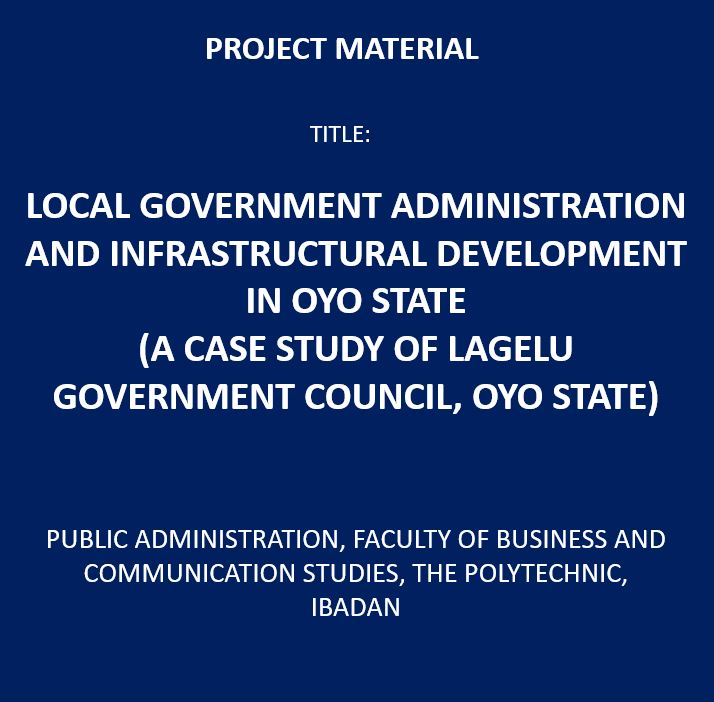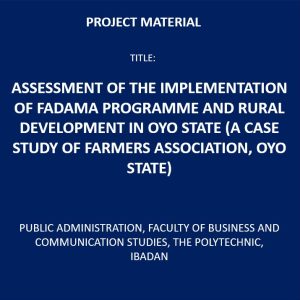No products in the cart.
Local Government Administration and Infrastructural Development in Oyo State
₦10,150.00
LOCAL GOVERNMENT ADMINISTRATION AND INFRASTRUCTURAL DEVELOPMENT IN OYO STATE
- CASE STUDY: LAGELU GOVERNMENT COUNCIL, OYO STATE
- NUMBER OF PAGES: 54
- FILE TYPE: DOC - CHAPTER 1-5
- DEGREE: HND
- DEPARTMENT: PUBLIC ADMINISTRATION, FACULTY OF BUSINESS AND COMMUNICATION STUDIES, THE POLYTECHNIC, IBADAN
Background to the Study
Infrastructural development is crucial to sustainable development in Nigeria. Many of countries of the world ensure the provision of infrastructure to improve the livelihoods of their citizens (Khoza, 2009). Infrastructure plays a key role in both socio-economic and political development and enrichment of living standards. Investment in infrastructure is critical to economic growth, access to education, healthcare, poverty reduction, general quality of life, and achieving many of the goals of a developing economy. (Khoza, 2009). According to Deans (1993), Infrastructures are the physical desirable facilities or services that offer individual pleasurable social experience, an added value quality service freely available within the environment of a community, society or nations. The availability of infrastructure promotes the better living condition of the citizen in general and thus, aids the conduct and operation of social and economic activities.
Infrastructure is the basic physical and organizational structures needed for the operation of a society. Infrastructural facilities like industries, buildings, roads, bridges, health services among others are indispensable for conduct of socio-economic activities and sustainable development. Ekong (2003) asserted that rural infrastructures constitute a significant position in rural dwellers welfare and infrastructural development in these areas facilities sustainable development in the state. According to Fakorede (2018), it is obvious that rural population has limited access to modern farming inputs, productive resources, and basic infrastructures such as schools, health centres, potable water, good feeder roads, culverts, storage and irrigation facilities.
The local government is essentially created as a viable political and administrative organ for the transformation of all communities and for delivery of essential services to the citizens. The primary purpose of the local government and the basis for its existence is to create a mass development impetus to the grassroots transformation (Adeyemo, 1995). The need to catalyze balanced development, maximize citizens’ participation, and arouse government responsiveness to local need necessitates the creation of the local government. Aside from this feedback function, other functions of the local government include service delivery, promotion of democratization at local level, and mobilization of human resources for grassroots enhancement.
The performance of important functions places the local government in a strategic position for promoting sustainable development. The local government has fundamental role to play in the development of infrastructures at the grassroot level. The local government is constitutionally empowered to develop feeder roads, primary health care centres, shops and other infrastructures that can facilitate sustainable grassroot development. Ugwu (2003) observed that the local government is expected to play meaningful role in infrastructural development. This is because the local government is the closest level of government to the grassroot and it is expected to formulate policies that would stimulate grassroot development and as well implement projects that are rural in nature in order to complement the efforts of both the state and federal government. Adebayo (2008) observed that ‘the constitution gives the local government the power to construct feeder roads, local bridges, market and such other local infrastructural facilities for the benefits of the people of the local communities under their jurisdiction
Adebayo (2008) added that Local government constitutes the most essential level through which development journey of any nation could begin. In developing countries of the world where national development is at the forefront of national issues and policies, local government has been seen as one of the most germane role player in achieving development plans. In fact, most of the developed nations of the world jump started their development from formulation and implementation of development projects, plans, policies and programmes from the grassroot. Thus, the study intends to examine local government and infrastructure development in Oyo State with a particular reference to Ibadan North Local Government, Oyo State






